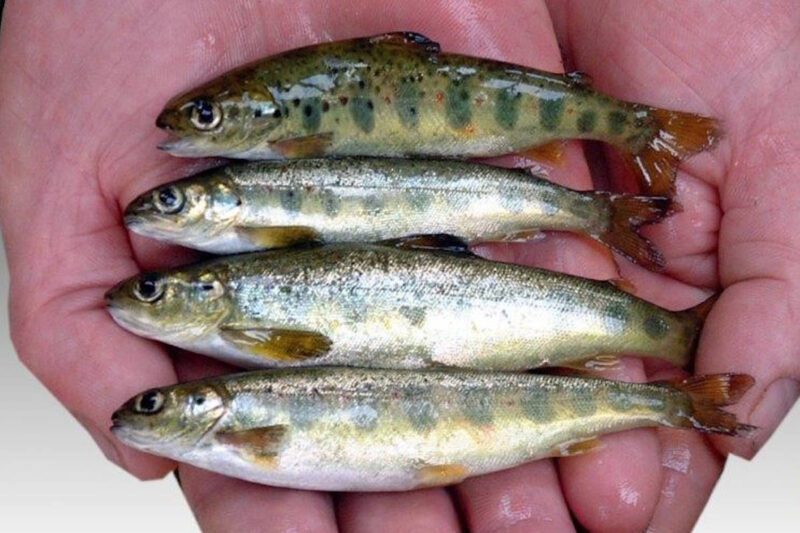Mowi forced to cull 3 million baby salmon
Policy change, seen as an attempt by Fisheries Minister to thwart a Federal Court ruling, causes unnecessary slaughter of baby salmon, equivalent to 61 million meals lost.
By Fabian Dawson
SeaWestNews
Fish farmer, Mowi Canada West, will begin culling more than three million baby salmon at its hatcheries in the coming weeks, as a result of the sudden decision by Ottawa to change policies governing the transfer of fish in BC’s Discovery Islands.
The policy change is seen as an attempt to thwart a Federal Court ruling that ordered Fisheries Minister Bernadette Jordan to allow the fish transfer pending a judicial review of her entire decision to phase out salmon farms in BC’s Discovery Islands.
Jordan, in making her pre-Christmas Discovery Island decision, ignored her own scientists who said the fish farms posed less than a minimal risk to wild stocks migrating through the area; her own deputy minister, who recommended for a more coordinated approach to the closures; and the agreement between Mowi and the Kwiakah First Nation to facilitate the transfer.
Aiming to placate urban anti-salmon activists in exchange for votes, Minister Jordan is forcing this unnecessary slaughter of fish, which is the equivalent of 61,000,000 million meals lost, according to industry officials.
“Minister Jordan continues to put us in untenable situations and we don’t understand why. She has now twice substantively changed the requirements without any input, consultation or discussion with this sector,” said Dr. Diane Morrison, Managing Director for Mowi Canada West.
Aside from the cull at its hatcheries, Mowi said it will continue to try to find a transfer home for an additional 600,000 fish already at sea that were destined for farms in the Discovery Islands.
This batch of fish already at sea at Mowi’s Port Elizabeth farm in the Discovery Islands will be moved into another salmon farm in the Broughton Archipelago, on the northeastern flank of the Queen Charlotte Strait, which is seeing a far more orderly transition of 17 fish farms, that will be completed by 2023.
Unlike the Discovery Islands decision, the Broughton salmon farm transition plan brought together local First Nations, the BC Government and the fish farmers for a deal to protect wild stocks, recognize traditional treaty rights and pave the way for future expansion of B.C.’s sustainable salmon aquaculture industry.
When making the Discovery Islands decision, Minister Jordan did not consult with the BC Government, nor the industry or the local communities that would be impacted by the closures planned for by June 2022.
In its entirety, Minister Jordan’s unexpected Discovery Islands’ decision will see BC losing almost $390 million in annual economic output with $87 million less in annual salaries and benefits, and 1,535 fewer jobs, mainly in coastal communities of BC, according to industry estimates.
The devastating economic fallout triggered by the closures of the salmon farms will also spread to Surrey – the Lower Mainland’s salmon farming hub – killing 344 jobs.
The fish farmers have applied for a judicial review of the minister’s Dec 17th decision and have already won an injunction allowing them to continue transferring their salmon into the ocean farms pending a Federal Court ruling on the entire planned phase out by June 2022.
“The only evidence before me is that today, salmon aquaculture in B.C. poses no more than a minimal risk to wild salmon” said Mr. Justice Panagiotis Pamel, in granting the injunction.
But Minister Jordan, who was ordered by the Federal court to “turn back the clock” on her Discovery Islands decision ordered Mowi Canada West to reapply to transfer fish.
The Department of Fisheries and Oceans (DFO) then increased its service standard for such applications from the current 20 days to 40 days, meaning that any denial or approval for the transfer of salmon smolts to be grown to harvest size could only come in June, which will be too late to have any meaningful impact.
Responding to queries from SeaWestNews on the policy change, a DFO spokesperson said;
“The amended service standard (to 40 days) has been decided upon to allow time to properly engage with First Nations, whose traditional territory is in the Discovery Islands area, on transfer applications into their territory and to allow industry the opportunity to respond to First Nations input. The Department is aware of industry’s production process timelines but is committed to ensuring that all parties have the opportunity to provide input on the matter.”
“The Department recognizes the importance of having sound science advice and fish health information, alongside feedback from consultations with First Nations, industry, stakeholders and other experts, in order to appropriately inform decisions,” she said.
But Mowi Canada West has not heard from the minister since she announced her decision.
“It is shocking that a Federal Minister can so cavalierly disregard not only the people who rely on this sector but also the Federal Court of Canada and the administration of regulatory fairness that governs all resource sectors across Canada,” said Dean Dobrinsky, spokesperson for Mowi Canada West.
“To date, we have received no response from the Minister,” he said.
The B.C. Salmon Farmers Association (BCSFA) said it is not asking for a reversal of the Discovery Islands’ decision but only for more time to minimise damage to the industry and its fish.
“We’ve never said that we’re asking the government to reverse this decision,” John Paul Fraser, Executive Director of the B.C. Salmon Farmers Association (BCSFA), told a Surrey town hall last week.
“It went through a process – by all accounts, an incredibly flawed process – but it made its decision. What we’re asking for the government is to give this decision an appropriate consideration, and that can start actually with stopping the clock.”
Fraser said the industry needed five years to “work itself through so that you minimize damage to people and to animals.”
(Image of hatchery salmon courtesy of Mowi Canada West)

